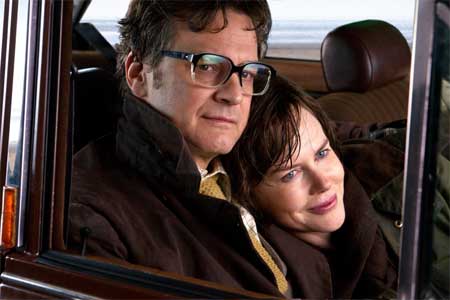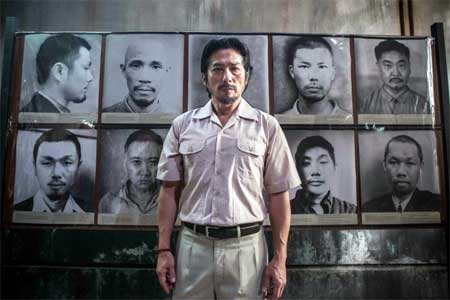Film (2013)
Directed by Jonathan Teplitzky
Screenplay by Frank Cottrell Boyce and Andy Paterson
Based on a book by Eric Lomax
Music by David Hirschfelder
Cinematography by Garry Phillips
Film Editing by Martin Connor
With Jeremy Irvine (Young Eric), Colin Firth (Eric), Stellan Skarsgård (Finlay), Nicole Kidman (Patti), Tanroh Ishida (Young Nagase), Hiroyuki Sanada (Nagase)

Nicole Kidman as Patti
in “The Railway Man”
©2014 The Weinstein Company. All rights reserved.
Based on a a true story, this layered tale of flashbacks of Eric (Colin Firth), effectively shows his confrontation with a deeply traumatic past. Approached from a subtle perspective, we arrive at the tale midstream, as Eric meets Patti (Nicole Kidman) in the early 1960s. As their tale evolves, so does the deeper, darker one of Eric’s World War II experiences. When push comes to shove and with encouragement close to home, he travels to confront his past and his demons, with profound and remarkable results.

in “The Railway Man”
©2014 The Weinstein Company. All rights reserved.
I found this a deeply moving film. Though it is a shocking and difficult story, there is so much humanity evoked in its narrative that the horrors are outweighed by its import. The interleaving of the love story between Eric and Patti along with the uncovering of the traumas of Eric’s internment and his confrontation with them makes a compelling historic and psychological tapestry.
The film is beautifully acted and directed.
Colin Firth does a superb job in the central role, carrying unbearable weight with a gracious balance, revealing just enough strain in his decorum to make us realize that things are not right with the world.
Jeremy Irvine conveys the nobility and decency of the young Eric, painting a modestly heroic portrait with understated but compelling gestures.
Nicole Kidman as Patti is subtly appealing and vividly present in her characterization, believably supportive as she is challenged by the unfolding realities and horrors of Eric’s past.

in “The Railway Man”
©2014 The Weinstein Company. All rights reserved.
As the young Nagase, Tanroh Ishida has a fearsome authenticity. As the older Nagase, Hiroyuki Sanada delivers a difficult yet compelling portrait of a man with a long memory and a difficult weight to bear.
The stunner at the end of the film with its striking denouement is rivetingly compelling in its documented reassurances.
There are all kinds of ways this film could have gone wrong and it is testament to the director that its violence is not overplayed and its resolutions are not overly sentimentalized. Though the dramatized encounter between Eric and Nagase near the end is a slightly less persuasive part of the film, it is indeed the most dramatically vulnerable and in the overall context makes considerable sense.
Anyone interested in recovery from trauma, and the general issues of dialogues and peacemaking, should run out and see this film. It is sensitively done, instructive and deeply inspirational.
– BADMan
Leave a Reply